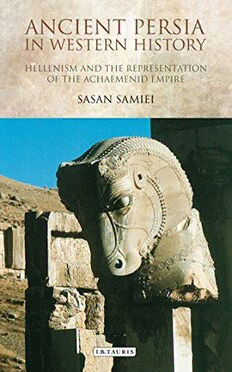
Ancient Persia in Western history : Hellenism and the representation of the Achaemenid Empire PDF
Preview Ancient Persia in Western history : Hellenism and the representation of the Achaemenid Empire
Sasan Samiei completed his PhD in S Ancient Persia The Achaemenid Empire, founded by Cyrus the a Intellectual and Ancient History s Great in the sixth century BC, was at its height a at University College London and also ‘The Achaemenid Persian Empire has long been regarded in Western History the largest empire the world had yet seen, n holds an MSc in Economics from the stretching across Asia, the Middle East and as the embodiment of the eastern “other”, representing S London School of Economics (LSE). everything opposed to Greek (“western”) ideals of freedom a North Africa. Because this first Persian Empire He lives in Lewes,East Sussex. m fought a series of wars against the Ancient and democracy – this, despite the fact that Persian belongs Hellenism and the Representation i Greek city-states, it has often been cast in to the same language family as most European ones. This e of the Achaemenid Empire i opposition to the Hellenistic cultures of the fine study focuses on the British archaeologist, Sir John period. Ancient Persia in Western Historyis a Linton Myres, who had examined the Graeco-Iranian iA Sasan Samiei measured rejoinder to the dominant narrative world from an Indo-European perspective. Setting his n that considers the Graeco–Persian Wars to be analyses of anthropology, prehistoric archaeology, and n merely the first round of an oft-repeated battle Hellenism within the boundaries provided by Myres’ W between the despotic ‘East’ and the broadly multifaceted output, Samiei examines how the popular c enlightened ‘West’. Sasan Samiei analyses the picture of the Persian Empire continues to play a e dominant role in contemporary historiography.’ si historiography which has skewed our Amelié Kuhrt, Professor Emerita of Ancient History, te understanding of this crucial era – contrasting UCL, and a Fellow of the British Academy the work of Edward Gibbon and Goethe, which en venerated Classicism and Hellenistic history, r with later writers such as John Linton Myres. ‘Modern historians pride themselves on their willingness to nt Finally, Samiei explores the cross-cultural learn from the insights of other disciplines. But rarely does encounters which constituted the Achaemenid one encounter an historian so willing to engage in detail HP period itself, and repositions it as essential to the with such a great range of other subjects. Sasan Samiei’s doctoral dissertation, on which his book is based, was an ie history of Europe, Asia and the Middle East. outstanding example of a cross-disciplinary approach. His s r arguments are based on a remarkably wide set of readings t in a remarkably diverse body of specialist literature.’ os Stephen Conway, Professor of Modern History, UCL i r a y Jacket design:BRILL Jacket image: A detail from the ruins at Persepolis, the ceremonial capital of the Achaemenid Empire, in present-day Iran. Alexander the Great sacked the city in 330 BCin consequence of which, as the author argues, the Achaemenid Empire has come to be seen largely through the prism of a Hellenistic world view, which in turn has influenced how the West has understood Persepolis and the Persian Empire. www.ibtauris.com SasanSamieicompletedhisPhDinIntellectualandAncientHistory at University College London and also holds an MSc in Economics from the London School of Economics (LSE). He lives in Lewes, EastSussex. ANCIENT PERSIA IN WESTERN HISTORY Hellenism and the Representation of the Achaemenid Empire S S ASAN AMIEI Publishedin2014byI.B.Tauris&Co.Ltd 6SalemRoad,LondonW24BU 175FifthAvenue,NewYorkNY10010 www.ibtauris.com DistributedintheUnitedStatesandCanada ExclusivelybyPalgraveMacmillan 175FifthAvenue,NewYorkNY10010 Copyrightq2014SasanSamiei TherightofSasanSamieitobeidentifiedastheauthorofthisworkhasbeenasserted bytheauthorinaccordancewiththeCopyright,DesignsandPatentsAct1988. Allrightsreserved.Exceptforbriefquotationsinareview,thisbook,oranypart thereof,maynotbereproduced,storedinorintroducedintoaretrievalsystem, ortransmitted,inanyformorbyanymeans,electronic,mechanical,photocopying, recordingorotherwise,withoutthepriorwrittenpermissionofthepublisher. Referencestowebsitesandonlinecontentwereaccurateatthetimeofwriting. InternationalLibraryofIranianStudies47 ISBN:9781780764801 eISBN:9780857736062 ePDF ISBN: 978 0 85772 414 4 AfullCIPrecordforthisbookisavailablefromtheBritishLibrary AfullCIPrecordisavailablefromtheLibraryofCongress In memoriam of my great-great-grandfather Mirza Mohammed Ali Khan Rahmat Abadi. A constitutional revolutionary, a parliamentarian (1906/7–1909), and a democrat CONTENTS Acknowledgements ix Preface xii 1. Introduction 1 2. Setting the Scene: Anthropology, Linguistics and Romantic Hellenism in Victorian Britain 14 3. The ‘Race–Culture’ Debate: 1900s–1930s 48 4. The ‘Diffusionism vs. Evolutionism’ Theoretical Debate, Gordon Childe and the Prehistory of Europe 79 5. Hellenisms Reassessed (1890s–1940s): Part I 105 6. Hellenisms Reassessed (1890s–1940s): Part II 147 7. Hellenisms and the Historiography of Ancient Persia 179 8. Concluding Remarks 235 Postscript 246 Glossary 249 Notes 257 Bibliography 296 Index 311 ACKNOWLEDGEMENTS The planning of this book goes back to 2006. My under- and postgraduate tutors started the ball rolling by recommending me for an MPhil place at the University College London (UCL). My thanks must therefore go to Jacek Rostowski (Professor of Economics, and the current Economic Minister of Poland), and Peter Howlett (Professor of Economic History, London School of Economics and Political Science). Throughout my time at the UCL, Ame´lie Kuhrt (my first supervisor) was always at hand to offer learned advice. She read my work with the greatest of care, and when she offered guidance for various improvements, her proposals were always exquisitely judged. Moreover, when she challenged some of my outlandish ideas and assumptions, she probed me gingerly, and was gentleness itselfinhercriticisms.IbelievethatAme´liehasmouldedahistorian with much improved reflective and analytical faculties. And for that, as well as for many other acts of kindness, I am eternally indebted to her. My meetings with Stephen Conway (my second supervisor) were usually over lunch; the financial burden of which, more often than not, was incurred by him. This was only part of his wonderful generosity. He read everything that was asked of him and provided very helpful suggestions in how to improve things. The value of his continuing and enthusiastic support is truly beyond measure. I am
